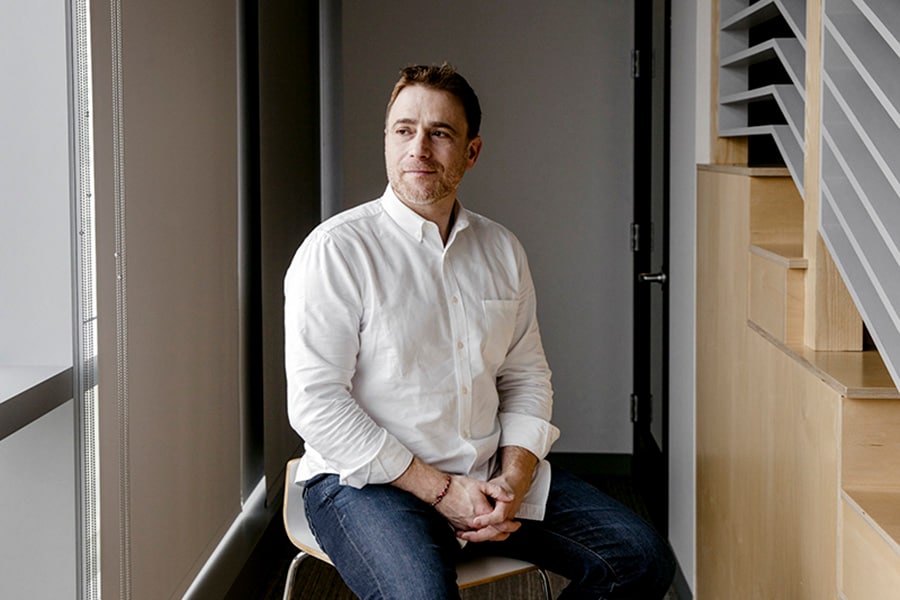On another occasion, Butterfield bought a snarky full-page newspaper ad to taunt a rival, Microsoft. And he has tweeted expletive-laden opinions about President Donald Trump, as well as emoji-heavy messages ruminating on the cosmos.
So it was a signal of how much had changed when Butterfield, 46, tweeted last month that he missed the days when “pretty much no one paid attention to me so I could say whatever I wanted and not worry about it.”
Butterfield has had to button up his mouthiness as Slack, which he co-founded in 2009, prepares to go public on June 20. With his company last valued at $7.1 billion, serving more than 88,000 paying customers and employing more than 1,500 workers, he is adapting to life as someone who will soon be openly subject to scrutiny from Wall Street, regulators and others.
That has meant that Butterfield has tried to avoid media for the last year. He declined to speak with The New York Times for this article, citing his company’s quiet period ahead of its listing. And Slack has taken an extremely conservative approach to going public, even telling investors to avoid “liking” tweets about the company.
“A quiet period for him is probably more unnatural than it is for most,” Jennifer Rubio, co-founder of luggage startup Away and Butterfield’s fiancée, said of him.
Slack’s public listing carries particular significance now. This year was supposed to be a banner one for tech public offerings. But in recent months, the stocks of the ride-hailing firms Lyft and Uber have fizzled after their initial public offerings, raising questions about whether other tech companies would meet the same fate.
Now many eyes are on Slack and how it performs after going public. The company is planning a “direct listing,” where it will not issue new shares to sell, but simply let its shares start trading on a stock market. Its share price will be set solely by demand from public-market investors.
Slack also faces a crucial test as it transitions from a viral chat app to a more traditional operation selling workplace technology to global corporations. It will be no easy task as Butterfield deals with competition from Microsoft, which offers a product called Teams, and as Cisco and Facebook push similar tools. Slack is small compared with those giants on Friday, it disclosed that it lost $32 million in the first quarter, while revenue rose 67% from a year ago to $135 million.
“There is one set of skills in making technology find the lips of all young developers around the world,” said Michael Facemire, an analyst at Forrester. “There’s another set of skills to sell that into the enterprise.”
Butterfield appears to be feeling the weight of responsibility. In April, at a conference Slack holds for customers and partners in San Francisco, he riffed in an onstage interview with the tennis megastar Serena Williams about how much rested on his shoulders.
“The success of the business, the happiness of the employees, its impact on customers — all that stuff,” he said. “It can be a lot to manage.”
Butterfield, who spent his early years at a commune in British Columbia, was named Dharma at birth. At age 12, he changed his name to Daniel. (Stewart is his middle name.) At the University of Victoria, where he studied philosophy, he discovered Usenet, email and Internet Relay Chat — the web protocol that forms the basis of Slack.
After graduating, he worked as a web designer and blogged about photography and tech nerdery. Along with his wife at the time, Caterina Fake, and a friend, Jason Classon, Butterfield eventually co-founded Ludicorp, a company based in Vancouver, British Columbia, which created a video game called Game Neverending and a photo-sharing site, Flickr.
Yahoo bought Flickr in 2005 for around $25 million, and Butterfield and Fake began spending more time in Silicon Valley. Butterfield left Yahoo in 2008 — but not before his email resignation, which included an elaborate, farcical story about tinsmithing that served as a metaphor for the internet company’s mismanagement, went viral. (That same year, he and Fake divorced.)
Slack grew out of Butterfield’s second attempt at building a gaming startup. The game, called Glitch, was a “massively multiplayer online” game where, instead of killing enemies, players went on quests and learned skills like baking or meditation.![g_116895_bg_slackipo3_280x210.jpg g_116895_bg_slackipo3_280x210.jpg]() FILE -- Slack"s offices in San Francisco, Feb. 7, 2017. Stewart Butterfield, Slack"s chief executive, has had to button up his mouthiness as Slack, which he co-founded in 2009, prepares to go public on June 20, 2019. (Carlos Chavarria/The New York Times)[br]“There was always a weird poetic bent to what he did,” said Anil Dash, a friend of Butterfield’s and chief executive of a software company that also took the name Glitch.
FILE -- Slack"s offices in San Francisco, Feb. 7, 2017. Stewart Butterfield, Slack"s chief executive, has had to button up his mouthiness as Slack, which he co-founded in 2009, prepares to go public on June 20, 2019. (Carlos Chavarria/The New York Times)[br]“There was always a weird poetic bent to what he did,” said Anil Dash, a friend of Butterfield’s and chief executive of a software company that also took the name Glitch.
When the video game failed to take off, Butterfield focused the company on an internal messaging system they had created. Slack, which is an acronym for “Searchable Log of All Conversation and Knowledge,” was publicly released in 2014 and quickly adopted by tech startup workers to message one another and hold group conversations.
Slack’s explosive growth soon made it an investor darling. The company raised $1.4 billion in funding from venture capital firms like Accel and Andreessen Horowitz, as well as SoftBank’s Vision Fund. Its valuation reached $7.1 billion in four years.
Eric Costello, a Ludicorp employee and Slack co-founder, said Butterfield was never driven by “being successful for its own sake, or just making lots of money.” Instead, Costello said, Butterfield enjoyed “the craft and the pleasure of applying that craft to build interesting, useful, beautiful things.”
Now Butterfield fills his home with useful, beautiful things, Rubio said. Those include a leather-wrapped console table from the luxury Americana furniture brand BDDW and a set of Japanese kitchen knives selected for craftsmanship and the quality of the steel.
He approached Slack’s software interface in a similar way, thinking philosophically about each feature. Slack’s ability to “snooze” messages received outside of work hours, for example, reflects Butterfield’s empathy for users, said Bradley Horowitz, an investor in the company.
Slack’s success has also made it an acquisition target it previously rebuffed interest from Microsoft, Amazon and Google. Some of those giants have since directly taken on Slack.
In 2016, Microsoft released Teams, a chat and collaboration app that integrates with its Office software. In response, Butterfield bought a full-page newspaper ad in The New York Times that read, “Dear Microsoft, Wow. Big news!” A letter accompanying the ad praised the virtue of “thoughtfulness and craftsmanship,” implying that Slack’s software contained intangible elements that a behemoth like Microsoft could not replicate.
Microsoft Teams is now used by more than 500,000 organizations, compared with Slack’s more than 600,000. Microsoft said Teams has seen “incredible adoption.” It did not have a comment on Slack.
Throughout, Butterfield has rarely held back his thoughts. When De Niro cursed at him at an awards event in 2015, Butterfield was delighted and tweeted, “#Lifegoals.” That same year, when The Times asked if he thought Slack was worth its steep valuation, he said, “It is, because people say it is.”
Yet as Slack has matured, Butterfield has had to hone his chief executive skills. He discovered that any feedback he gave, no matter how casual, was taken seriously by employees, said April Underwood, Slack’s former chief product officer. As a result, he tempered some comments, she said.
He has also grappled with how to “lead leaders” in the executives he hired, Costello said. “I know that is the area that has been most challenging for him.”
And Butterfield has learned that when you say the wrong thing publicly, it reflects on the entire company, Dash said. “There’s such a different weight to it than when it’s just your Twitter account,” Dash said.
Lately, Butterfield has kept his tweets focused on his personal life. When Rubio’s company announced last month that it had raised a fresh $100 million, he responded by proposing to her on Twitter while sharing the funding news.
“Let’s make today a double-whammy — @Jennifer, will you marry me? Promise I’m not a golddigger,” he tweeted, noting that she was on a flight.
In reality, they were at a restaurant with colleagues celebrating the funding the group had suggested the tweet as a joke, Rubio said.
Over Memorial Day weekend, Butterfield proposed for real on a hike in Tofino, British Columbia, with a ring he had purchased before the now infamous tweet. Rubio said she momentarily wondered if he was only proposing because of Twitter, asking, “Are you serious?”
She also said yes. Butterfield later shared a photo of the moment on Twitter.

 FILE -- Stewart Butterfield, Slack"s chief executive, at the company"s offices in San Francisco, Feb. 7, 2017. Butterfield has had to button up his mouthiness as Slack, which he co-founded in 2009, prepares to go public on June 20, 2019. (Carlos Chavarria/The New York Times)[br]SAN FRANCISCO — Stewart Butterfield, chief executive of the workplace collaboration app Slack, once offended Robert De Niro at an awards event with an irreverent comment, prompting the actor to curse at him from the stage.
FILE -- Stewart Butterfield, Slack"s chief executive, at the company"s offices in San Francisco, Feb. 7, 2017. Butterfield has had to button up his mouthiness as Slack, which he co-founded in 2009, prepares to go public on June 20, 2019. (Carlos Chavarria/The New York Times)[br]SAN FRANCISCO — Stewart Butterfield, chief executive of the workplace collaboration app Slack, once offended Robert De Niro at an awards event with an irreverent comment, prompting the actor to curse at him from the stage. FILE -- Slack"s offices in San Francisco, Feb. 7, 2017. Stewart Butterfield, Slack"s chief executive, has had to button up his mouthiness as Slack, which he co-founded in 2009, prepares to go public on June 20, 2019. (Carlos Chavarria/The New York Times)[br]“There was always a weird poetic bent to what he did,” said Anil Dash, a friend of Butterfield’s and chief executive of a software company that also took the name Glitch.
FILE -- Slack"s offices in San Francisco, Feb. 7, 2017. Stewart Butterfield, Slack"s chief executive, has had to button up his mouthiness as Slack, which he co-founded in 2009, prepares to go public on June 20, 2019. (Carlos Chavarria/The New York Times)[br]“There was always a weird poetic bent to what he did,” said Anil Dash, a friend of Butterfield’s and chief executive of a software company that also took the name Glitch.